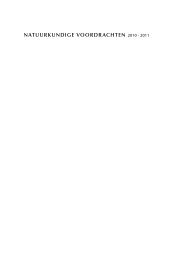Jaarboek no. 87. 2008/2009 - Koninklijke Maatschappij voor ...
Jaarboek no. 87. 2008/2009 - Koninklijke Maatschappij voor ...
Jaarboek no. 87. 2008/2009 - Koninklijke Maatschappij voor ...
Create successful ePaper yourself
Turn your PDF publications into a flip-book with our unique Google optimized e-Paper software.
Introduction<br />
IMMUNOLOGIE VAN DE HYGIËNE-HYPOTHESE<br />
Immu<strong>no</strong>logy of the hygiene hypothesis<br />
door<br />
Mw. prof. dr. M. Yazdanbakhsh<br />
Afdeling Parasitologie, Leids Universitair Medisch Centrum, Leiden<br />
Many studies have documented that the prevalence of sensitisation (IgE and skin prick test<br />
positivity) to allergens has been increasing, <strong>no</strong>t only in industrialised developed countries<br />
but also in less affluent developing countries (ISAAC III). However, there is considerable<br />
geographic variation in the prevalence of allergic disorders and although genetic factors<br />
may play a role in the development of allergic disorders, they are unlikely to explain the<br />
strong urban/rural differences that is seen in the prevalence of allergies. So far, epidemiological<br />
studies examining the geographical variation in the prevalence of allergic disorders<br />
have suggested that rural lifestyle confers protection, whereas urbanisation is an important<br />
risk factor for diseases such as asthma and atopic dermatitis. In rural Ethiopia, South<br />
Africa, Kenya and Gambia but also in rural traditional farmers residing in Europe (for<br />
example in Germany or in Eastern Europe), there is little allergy compared to major urban<br />
cities. It has been proposed that understanding the cause of the change in prevalence of<br />
allergies would help us understand the risk factors at the environmental and mechanistic<br />
level that are responsible for the so called ‘allergic march’ worldwide. This k<strong>no</strong>wledge<br />
can then be exploited to stop the allergy epidemics worldwide. One of the environmental<br />
factors, namely infections, is thought to play a role in this regard: although some respiratory<br />
infections are k<strong>no</strong>wn to exacerbate asthma, there is a list of other infections that are<br />
thought to play a protective role.<br />
Exposure to micro-organisms and parasites: risk or protective factor<br />
During the course of evolution man has constantly been exposed to a wide variety of micro-organisms<br />
and parasites, ranging from harmless to life-threatening ones. Our immune<br />
system has evolved to counteract dangerous infections but to tolerate or even to depend<br />
on harmless ones. For example, the gut microflora, is essential for the <strong>no</strong>rmal development<br />
of the immune system as shown in studies of animals raised under germ free conditions.<br />
Studies of the interaction of the immune system with molecular patterns present<br />
on bacteria in the gut have shown, for example, bacterial polysaccharide to be essential<br />
for the development of a fully functional immune system. In line with this, there has been<br />
much interest in, and controversy over, the relationship between infections and allergies.<br />
The Hygiene Hypothesis<br />
The hygiene hypothesis was initially proposed by David Strachan when he observed that<br />
in a British Cohort study allergic rhinitis was more prevalent among first-borns and less<br />
Natuurkundige Voordrachten Nieuwe reeks <strong>87.</strong> Lezing gehouden <strong>voor</strong> de <strong>Koninklijke</strong><br />
<strong>Maatschappij</strong> <strong>voor</strong> Natuurkunde ‘Diligentia’ te ’s-Gravenhage op 23 maart <strong>2009</strong>.<br />
Immu<strong>no</strong>logie van de hygiëne-hypothese




